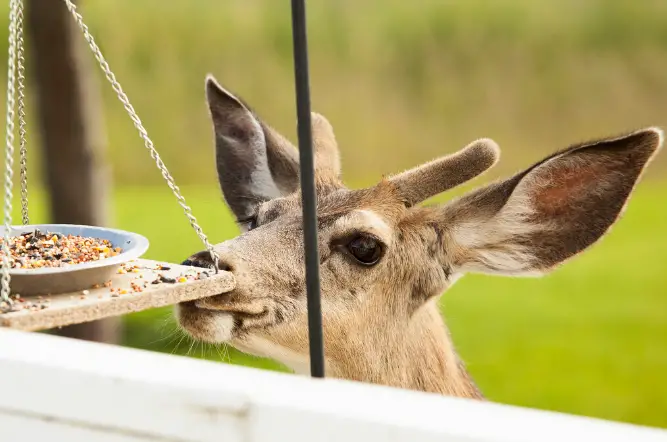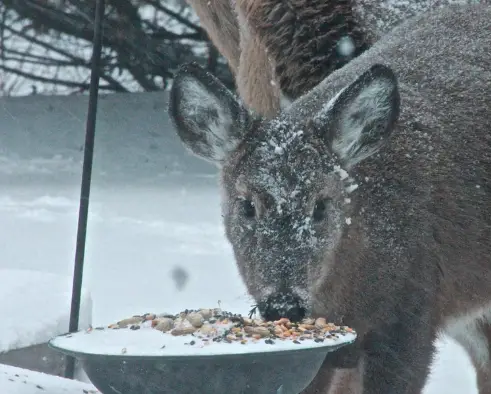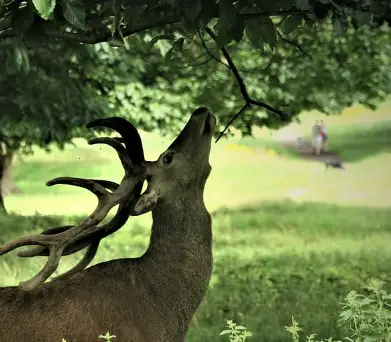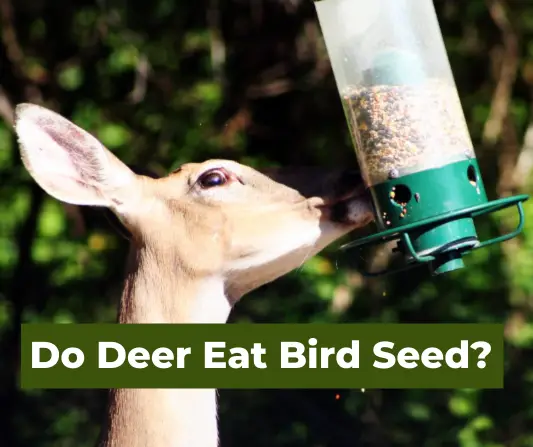Yes, Deer Do Eat Bird Seed: Sorry, Feathered Friends!
Deer are known to have voracious appetites and will eat an impressive range of foodstuffs. This begs the question, do deer eat bird seed? Yes, deer do eat bird seed. Bird seed is packed with nutrients that deer need to stay healthy and strong.
For those who enjoy feeding birds in their yard, it’s important to note that deer may also come along and eat the bird seed, leaving none for the birds! While it may seem like a nuisance, it’s important to remember that deer are also a part of the wildlife ecosystem. It’s important to monitor how much bird seed the deer are consuming, as too much can lead to health problems.
We’ll cover your options whether you want to feed bird seed to deer or if you want to find ways to keep them away from your bird feeders in this guide.
Is Bird Seed Bad For Deer?

Deer are known to eat a wide variety of food, including leaves, twigs, nuts, fruits, and berries. They are also known to eat bird seed, but is it bad for them? Let’s find out.
Bird seed can be harmful to deer if they consume too much of it. It is often high in fat and calories but low in nutrients. This can lead to obesity and other health problems in deer. Additionally, bird seed can contain chemicals and pesticides that can be harmful to deer if they consume too much. That’s why it’s important to monitor the amount of bird seed that deer are consuming.
While bird seed is not necessarily bad for deer, it definitely should not be their primary source of food. Deer are grazing animals and require a balanced diet that includes vegetation such as acorns, leaves, and twigs. Sunflower seeds can be a good source of nutrition for deer, but they should be offered in moderation.
Location is also an important factor to consider when feeding deer. If bird seed is placed in an area that is frequented by pests such as raccoons or squirrels, it can become moldy or contaminated with feces, which can be harmful to deer if they consume it.
We’ll cover some ways to keep deer away from your bird feeders next.
How Do You Keep Deer From Eating Bird Food?

Deer are known to be attracted to bird feeders, which can be frustrating for bird enthusiasts. Here are some effective ways to keep deer from eating bird food:
Hang Your Bird Feeders Higher
One way to keep deer from eating bird food is to hang your bird feeders higher. Deer can jump up to 8 feet high, so it is recommended to hang your feeders at least 6 feet high. This will make it difficult for them to reach the feeders and discourage them from visiting your yard.
Use Nyjer (Thistle) Seeds
Deer do not like the taste of Nyjer (Thistle) seeds, which makes them a great option for bird feeders. These seeds taste bitter to most mammals, including deer and squirrels, and are not particularly appetizing. Using Nyjer seeds in your bird feeders will ensure that the deer stay away from them.
Use Safflower Seeds
Another type of birdseed that deer do not like is safflower seed. Safflower seeds are high in protein and fat, which makes them a great source of nutrition for birds. However, deer find them unappealing due to their bitter taste. Using safflower seeds in your bird feeders can help keep the deer away.
Add Hot Pepper Oils
Deer have a sensitive sense of smell, and adding hot pepper oils to your bird food can help deter them from eating it. The strong scent of the hot pepper oils will make the food less appealing to the deer, and they will be less likely to visit your yard. Plus, it won’t bother the birds that are eating the seeds.
Avoid Corn and Sunflower Seeds
Deer are attracted to corn and sunflower seeds, so it’s best to avoid bird feed mixes that include both of these ingredients.
Deter Deer From Your Yard
In addition to using deer-friendly bird food, there are other ways to deter deer from your yard. Fencing is a great option, but it can be expensive. You can also plant deer-resistant vegetation, such as vegetables, berries, and buds, to make your yard less attractive to them. Using deer repellent sprays or cayenne pepper can also be effective.
Provide Vegetation and Fruits
Instead of just offering bird seed, consider planting vegetation and fruit trees that birds can enjoy.
This will provide a natural food source for birds and reduce their dependence on bird feeders.
Keep the Area Clean
Make sure to clean up any spilled bird seed and keep the area around the feeders clean. This will reduce the odor and competition for food, which can attract deer.
How High Can Deer Reach for Food?

Deer are known to have impressive jumping abilities, but how high can they reach for food? When it comes to bird seed, deer can reach surprisingly high.
According to wildlife experts, deer can reach up to 7 feet high and can jump even higher, which means they can easily reach bird feeders that are mounted on poles or low-hanging branches. However, they may struggle to reach feeders that are positioned higher than 8 feet.
Deer will also eat baby birds in their nests, so it’s critical that you take measures to deter deer from your yard!
To keep deer from reaching bird feeders, it is recommended to mount them at least 7-8 feet above the ground. This will make it difficult for deer to reach them successfully.
Another option is to use bitter-tasting seeds such as safflower and Nyjer. Deer are less likely to eat these types of seeds, making them a good choice for bird feeders that are located in areas with high deer populations.
It is important to note that while deer will eat bird seed, it is not their preferred food. They typically graze on grasses, shrubs, leaves, flowers, twigs, and fruits in the wild. Bird seed should not be relied upon as a primary food source for deer, as it does not provide enough nutrition to sustain a healthy diet.
In summary, deer can reach up to 8 feet high for food, which means they can easily reach bird feeders that are mounted on poles or low-hanging branches. To keep them away from bird feeders, it is recommended to mount them at least 7-8 feet above the ground or use bitter-tasting seeds.

